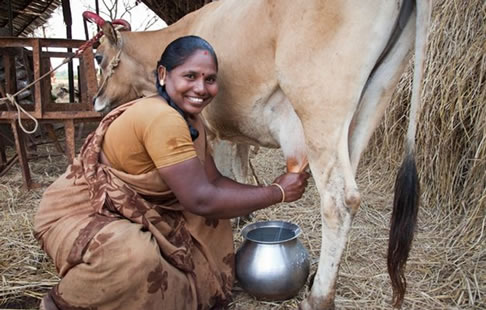 |
Egabire tebura kikama. (Runyankore) Ng’ombe yenye maziwa haikosi mtu wa kuikamua. (Swahili) La vache qui a du lait ne manquera pas quelqu’un pour la traire. (French) The cow that has milk will never lack someone milking it. (English) |
Runyankore (Uganda) Proverb
Background, Meaning and Everyday Use of the Proverb
The Banyankole are located in southwestern Uganda. At the turn of the nineteenth century they numbered about 400,000 people. This former kingdom is well known for its long-horned cattle, which were objects of economic significance as well as prestige. The Mugabe (King) was an absolute ruler. He claimed all the cattle throughout the country as his own. Chiefs were ranked not by the land that they owned, but by the number of cattle that they possessed. Banyankole society is divided into a high-ranked caste (social class) of pastoralists (nomadic herders) and a lower-ranked caste of farmers. The Bahima are cattle herders and the Bairu are farmers who also care for goats and sheep. The Banyankole speak a Bantu language called Runyankole. It is a member of the Niger-Kordofanian group of language families. In many of these languages, nouns are composed of modifiers known as prefixes, infixes, and suffixes. Word stems alone have no grammatical meaning. For example, the prefix ba -signifies plurality; thus, the ethnic group carries the name Ba-nyankole. An individual person is a Mu-nyankole, with the prefix mu -carrying the idea of singularity. Things pertaining to or belonging to the Banyankole are referred to as Ki-nyankole, taking the prefix ki -. The pastoral Banyankole are known as Ba-hima; an individual of this group is referred to as a Mu-hima. The agricultural Banyankole are known as Ba-iru; the individual is a Mu-iru.
Traditionally cattle are still highly valued among the Banyankole and the Bahima. They are still held in high regard. The Banyankole herders consume milk and butter and drink fresh blood from their cattle. The staple food of a herder is milk. Beef is also very important. When milk or meat are scarce, millet porridge is made from grains obtained from the Bairu. Buttermilk is drunk by women and children only. When used as a sauce butter is mixed with salt, and meat or millet porridge is dipped into it. Children can eat rabbit, but men can eat only the meat of the cow or the buffalo. Herders never eat chicken or eggs. Women consume mainly milk, preferring it to all other foods. Cereals are domesticated in Africa; millet, sorghum, and eleusine dominate the agricultural Bairu sector. The Bairu keep sheep and goats. Unlike the herders, the farmers consume chickens and eggs. This common Runyankore proverb means that where there is food, people are always ready to eat. It is used to emphasize the value and importance of human beings in the society. It also reminds you that to get a daily living you must work hard.
 Biblical Parallels
Biblical Parallels
Genesis: 3:6:“And when the woman saw that the tree was good for food, and that it was a delight to the eyes, and that the tree was to be desired to make one wise, she took of the fruit thereof, and did eat; and she gave also unto her husband with her, and he did eat.”
Matthew 6:25:“Therefore I say unto you, be not anxious for your life, what you shall eat, or what you shall drink; nor yet for your body, what you shall put on. Is not the life more than the food, and the body than the raiment?”
Ecclesiastes 2:24:“There is nothing better for a person than that he/she should eat and drink, and make his/her soul enjoy good in his labor. This also I saw, that it is from the hand of God.”
Contemporary Use and Religious Application
According to the Bible, life is not about food. Luke 12:23: “For life is more than food, and the body more than clothing.” But as human beings it is useless to ignore the role that food plays in our physical life. Luke 9:16-17: “And he took the five loaves and the two fishes, and looking up to heaven, he blessed them, and broke them and gave to the disciples to set before the multitude. And they ate and were all filled. And there was taken up that which remained over to them of broken pieces, twelve baskets.” It definitely means that for human beings to live, they must eat both kinds of food: spiritual food that is the Word of God and physical food such as fish, milk and bread.
This proverb is No. 48 in a Collection of 100 Runyankore Proverbs and Wise Sayings by Alimas Kaluta Adrien Socrates edited by Elias Bushiri Elie in collaboration with the African Proverbs Working Group, Nairobi, Kenya.
Alimas Kaluta Adrien Socrates
Nairobi, Kenya
Cellphones: +254 715 576 517
Email: alimasikaluta@gmail.com
Photographs provided by:
Cephas Yao Agbemenu
Department of Fine Arts
Kenyatta University
P.O. Box 43844
Nairobi, Kenya
Cellphone: +254 723-307992
Email: cyagbemenu@yahoo.com

